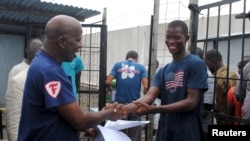Scientists are beginning to see real hope in the fight against the Ebola epidemic in West Africa. World Health Organization figures show that there were only seven cases of Ebola in September -- two in Guinea and five in Sierra Leone.
Of the three most-affected countries, Liberia has registered the most success in the fight. It was recently declared Ebola free for the second time this year. The country was first declared Ebola-free in May, but lost that status when a young man contracted Ebola in June.
A country attains Ebola-free status after going 42 days without any new infections. Sierra Leone started its 42-day countdown on Sunday, and hopes to join Liberia in the Ebola-free club in November.
'Collective effort'
Tolbert Nyenswah, Liberia's deputy minister of health, heads the country's incident management system, in charge of coordinating efforts to fight the deadly virus.
He said that achieving Ebola-free status could be attributed to the combined efforts of the government, people and the international community.
“It was a collective effort," he said, adding that most people in Liberia were now “sensitized to know what to do in terms of contact tracing, social mobilization, and community support."
Nyenswah said that early on in the epidemic, one of the main challenges was controlling the individuals and institutions that claimed that they had a cure for Ebola.
“What we knew in the health sector was that, officially there was no cure for Ebola, there was no new therapy... and so everyone coming in was bringing in their own trial in terms of therapies and drugs to try on Ebola patients,” he said.
To restrict this, Nyenswah said that his ministry came up with treatment guidelines of how to manage Ebola patients. “We used traditional public health measures to contain the outbreak," he said.
As of early September, two incubation periods of 42 days each passed without any new Ebola cases in Liberia. But Nyenswah said that his government was still taking precautions to prevent the virus from popping up again. He said that the country has learned from the past. “This time we have gained knowledge," he said.
The Deep scars of Ebola
WHO figures show that almost 5,000 Liberians have died from Ebola since the outbreak there began in early 2014.
Overall, the number of confirmed cases in the three West African countries stands at more than 27,000, with 11,000 deaths.
Liberian President Ellen Johnson Sirleaf told the U.N. General Assembly this week that Ebola “had left indelible marks of grief, sorrow and unimaginable affliction in Liberia and the West Africa sub-region in general.” She said that Liberia and the two other affected countries were “determined to address the development losses of Ebola, including rebuilding better and more resilient health and education systems.”
Minister Nyenswah said the turning point in the efforts against Ebola came after the three governments realized that they had to collaborate in the fight.
“At a certain point we were approaching the Ebola crisis as a country crisis. But at sometime, our leaders came together and took this head-on as a regional crisis -- as a Manu River Union crisis," he said.
The three countries are now collaborating closely, a factor that has been credited with the reduction in new infections. “We knew that one country being Ebola-free was not enough to save the region," said Nyenswah.
Leaders of the Mano River Union (MRU) an regional bloc consisting of Sierra Leone, Liberia, Guinea and Ivory Coast, have established an Ebola Recovery Trust Fund. They are seeking $4.75 billion to offset the economic damage of the epidemic.
A U.N. conference in July raised over $3 billion to help in the recovery -- a good start, but well below the sum the MRU says is required “to cover the economic and financial cost of the epidemic.”
